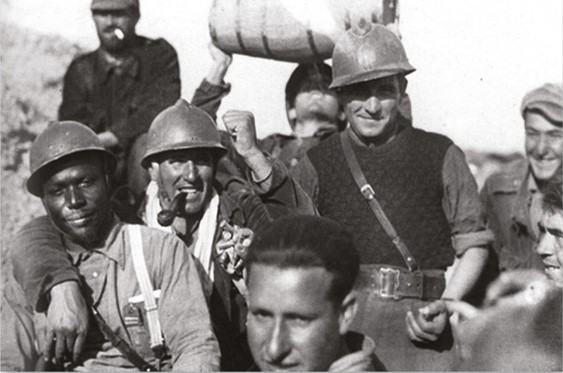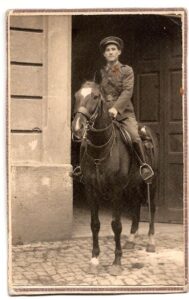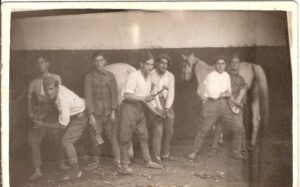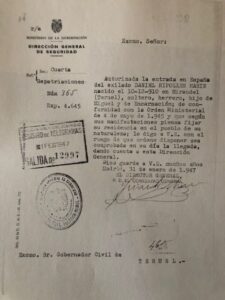Iconic Photograph Prompts Unknown Story

Oliver Law, Steve Nelson, and Daniel Repullés. Tamiment Library, NYU, ALBA Photo 184, Box 1, Folder 34.
Earlier this year, ALBA received a note from Alfonso Repullés Buj, a Spaniard in his late sixties from Aragón, about the iconic photograph from the Spanish Civil War in which Steve Nelson has his right arm around the shoulder of Oliver Law.
The helmet-wearing soldier in this photograph is my father, Daniel Repullés Marín (1910-1989). Born in Mirambel, in the Teruel province, my father trained as a blacksmith. The first time he left his town was when he was called up for military service in 1931, the same year the Second Republic was proclaimed. After completing his service, he returned home to work in his trade, but jobs were scarce in the 1930s.
When the war broke out, he was living in a local town, Iglesuela del Cid. From there he joined the Republican army as a Spanish soldier in the XV International Brigade, including the battles at Brunete and the Ebro. Although he suffered all the hardships that come with life at the front, he was never wounded and survived the POW camp.
The years after the war were marked by fear and silence. The adults, especially the defeated, preferred not to speak of the war. It was the best way to protect themselves and their families.
By now, having done a fair share of reading about the war, I understand why my father chose not to tell me about his experiences when I was young. How does one explain the barbaric things suffered in places like Brunete or the Ebro?
According to the records of the military tribunal, my father was imprisoned on November 15, 1938, and released on parole on July 27, 1943. Because, at that time, he was interned at a labor camp near Coll de Nargó, in Lérida, he went into exile to Andorra (I am not sure exactly how or when). His authorization for return indicates he reentered Spain in January 1947, and in late March reported to the Mirambel city hall and the Cantavieja post of the Civil Guard.
It wasn’t until October 2011 that I discovered my father in one of Henry Buckley’s photographs—which until then had been unpublished—of the goodbye ceremony organized for the International Brigades at La Espluga de Francolí (Tarragona) on October 25, 1938. That day, the 35 and 45 Division had concentrated there to avoid an enemy air attack. Among the troops there were the legendary battalions of British and U.S. volunteers. There were speeches and a parade. Three days later, the same troops marched along the Diagonal Avenue in Barcelona.
Shortly after returning to the Battle of the Ebro, my father was captured. Thus began another ordeal.
Truth be told, it was the discovery of that photograph that prompted me to begin reading more about the civil war. One day, when I’d finally gathered the courage to go to the Provincial Archive, I came across a folder with documentation about Daniel Repullés Marín, my father, with many bureaucratic papers. Among them, I found things like a Civil Guard report from June 1940 stating that my father has “always had leftist tendencies” or a report from the municipal judge that he was a Communist and “against religious ideas.”
To conclude, I would like to state that my father was a good, noble, and honorable man who was loyal to his ideals. He was honest and trustworthy, always ready to help, but very marked by the war and his experiences afterward. As General De Gaulle said on a private visit to Toledo, “The worst that can happen to a country is a civil war, because the end of the war does not mean the arrival of peace.”
Alfonso Repullés Buj, son of Daniel and Genoveva, was born in 1953 in Mirambel (Teruel). His family moved to Barcelona when he was 10, but he returned to his hometown after his retirement. He enjoys reading, writing, nature, and his and his wife’s occasional visits with their two daughters in Barcelona.















